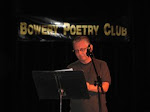Grab this ridiculously fabulous example of early 1990s Arabic art song here.
Watch a two-minute excerpt from a rare live performance of the title song:
I don't even know how to describe this album, which consists of two songs, the 47-minute-long "La Ya Sadiki" ("Babel") and the 4-minute "Ya Rayeh Lebnan." Kazim al Saher composes a lot -- perhaps all -- of his music, and it's entirely possible these two songs are his. If so, the man is a genius. Not that I didn't already think that about him. I did. But the title song of this 1993 album is as mind-blowingly intricate as it is expressive -- and if you know al Saher's music, you know you can pretty much always count on the latter.
I've got a bit of news to share with you all, but I'm going to save it for later. Right now, a dozen-plus boxes are calling me, waiting to be unpacked, their contents sorted, their fates decided upon.





























.jpg)






















































.jpg)


































